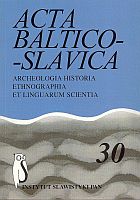Formy perfectum i ich funkcje w litewskiej gwarze puńskiej
The perfectum forms and their functions in the Lithuanian dialect of Punsk
Author(s): Danuta RoszkoSubject(s): Language and Literature Studies
Published by: Instytut Slawistyki Polskiej Akademii Nauk
Keywords: lithuanian subdialect of Punsk; verbal forms; semantic category of time; modality
Summary/Abstract: In the Lithuanian dialect of Punsk and in literary Lithuanian simple and compound verbal forms are distinguished. Simple dialectal forms (iterativum—the past iterative tense, praeteritum — the past non-iterative tense, praesens and futurum) reflect the situation known from the literary language. The dierences, however, are found in the compound forms. In the literary variant those are forms of perfectum and inchoativum. The Lithuanian dialect of Punsk has no inchoativum forms. The paradigm of dialectal perfectum forms diers from its literary counterpart in two respects. Firstly, there is no copula in the dialectal forms of perfectum praesenti for the 1st and 2nd person, both singular and plural. In the literary language the role of copula is played by a finite form of the verb bťuti (‘to be’). Secondly, the Lithuanian dialect of Punsk allows the use of a finite form of the dialectal verb tur˙ec (literary: tur˙eti) ‘to have’ as a copula. Two essential meanings of the dialectal perfectum are distinguished in the Lithuanian dialect of Punsk: a temporal and a modal one. Temporal meanings are further divided into resultative ones (e.g. dialectal Iđlavus padlagi. — I have washed the floor. (+ result: the floor is now clean)) and experiential (asserting) ones (for instance, dialectal Ađ buvis Vokietijoj. — I have been to Germany. (+ experience: I know how people live there, I know what cities and villages look like etc.). The modal functions, in turn, comprise the following meanings: imperceptive (the speaker reports information while expressing doubts as to its truthfulness), hypothetical (the speaker says that P is possible) and conclusive (based on physical results the speaker says that P is possible). Recently, an influence of literary norms on the dialectal form of perfectum has been observed. This includes the use of finite verb forms of the dialectal verb bťuc ‘to be’ and the literary bťuti ‘to be’ in the function of a copula in the 1st and 2nd persons singular and plural, as well as replacement of dialectal participle forms with their literary equivalents.
Journal: Acta Baltico Slavica
- Issue Year: 2006
- Issue No: 30
- Page Range: 519-531
- Page Count: 13
- Language: Polish

